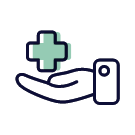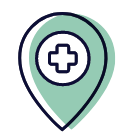Transform Patient Care
Integrate clinical-grade Lifetime Genomics Risk Assessments into your practice and identify up to 2-4x more at-risk patients compared to the current standard of family history
Transform Patient Care without Disrupting Your Clinic
Integrate clinical-grade Lifetime Genomics Risk Assessments into your practice and identify more at-risk patients compared to the current standard of family history. Nearly half of our patients have been identified as at increased risk for at least one common disease, knowledge of which empowers you to manage the patient using actionable insights with clinical utility proactively.
Built for Physicians by Physicians
Our risk assessments are supported by substantial peer-reviewed research and validated in real-life biobanks. Order from our provider portal in minutes and use our frictionless workflows, including automated reporting, at-home saliva collection, and training to integrate genomics seamlessly into your clinic.

Concierge / Primary Care
Offer a single proactive screen for assessing major disease risk to enable early detection and care paths personalized to your patient(s).

Oncology
Identify if genomics may influence a cancer diagnosis, cascade testing, and for blood clotting risk among newly diagnosed cancer patients.

Cardiovascular
PRS, recommended by the American Heart Association, is an improved risk stratification method compared to monogenic assessment.

Endocrinology
Identify those at risk for diabetes and comorbidities while distinguishing between Type 1 or Type 2 in atypical patients.

Vascular
Improve risk screening for VTE by 1.5-2.0x vs. FVL/PGM alone for cancer patients, during pregnancy and perioperative situations.

Clinical Support Staff
Access considerable genomic, early detection, and prevention training for doctors, nurses, physician assistants and other clinical staff.
Why is Common Genomic Variant Analysis so Valuable?
Only a small percentage of patients can accurately provide their family history, and traditional monogenic mutations (e.g., BRCA1/2) are rare. The Lifetime Genomic Risk Assessment, derived from millions of common genomic variants, can dramatically expand the number of increased-risk individuals you can identify, allowing you to provide a personalized, preventative approach in your clinic.
Click the link below to register and access ordering via the GenomicMD provider portal.